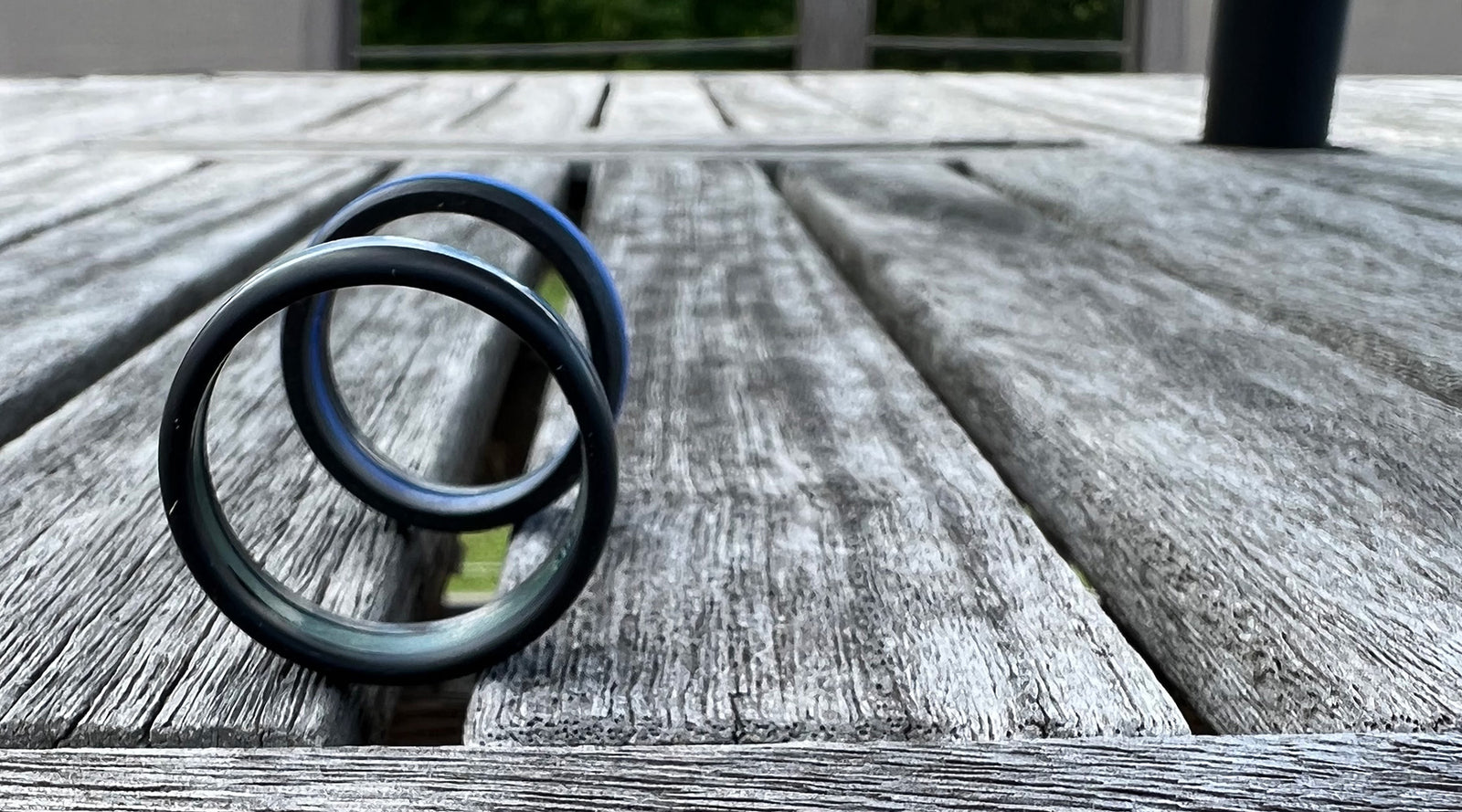Hazards to Avoid That Damage Silicone Rings
April 11, 2022

While watching a zombie movie the other day, we noticed a walking corpse wearing an intact silicone ring. The zombie was clearly the worse for wear, looking like he had been run over by a lawnmower, then trampled by a horse, then stuck in a well for a few days before crawling out to shuffle slowly across the countryside. His remaining clothes were tattered and filthy, and the same could be said of his skin. But his silicone ring was still hanging on.
That made us think about what silicone rings like ours can withstand, and what our customers should do to avoid potential damage to their RECON Ring.
As you probably know, silicone rings can hold up against extreme temperatures, are resistant to water, do not conduct heat or electricity, and, because they are flexible, they will break before your finger does. While silicone is basically a cross between rubber and plastic, that does not mean it is indestructible, and there are, of course, actions you can take to avoid any damage to your ring.
Here are a few situations and incidents you should try to avoid:
High Temperatures
Firefighters, soldiers, volcanologists, or people who love camping should remember that fire and extremely high temperatures can damage most everything. That being said, silicone rings have high heat resistance and will actually survive longer in extreme temperatures than the hand on which it is on. If your ring falls into a firepit, it will survive up to 140 degrees Celsius, although it will start to harden and lose its elasticity, making it more brittle. Just douse the fire or come back after it has been extinguished. On the more extreme side, if you are a volcanologist, or a tourist visiting the volcanos of Hawaii, for example, keep away from the edge or from any flowing lava, as we cannot guarantee your ring’s survival.
Impact
Silicone rings on average can withstand 15-20 pounds of pressure before they break, so things like a wayward hammer swing and closing your finger in a door should definitely be avoided. Falling off a cliff — or maybe cliff diving — is definitely something we do not recommend, as the force of the impact will probably break the ring.
Pressure
Sustained pressure is another hazard to avoid to keep your ring in good condition. Out in the wilderness, for example, stay clear of dangerous animals. The jaw pressure of a wild animal – whether a bear, shark, or even an eagle for you skydivers and paragliders out there – will most likely save your finger at the outset if you jam it between the gnashing teeth. But, true to the purpose of a silicone ring, if the pressure is too great the ring will break, leaving your finger exposed for the next chomp. So, in such a situation, probably best to find a stick or a rock, or if possible a piece of metal, to jam between ferocious jaws rather than thrusting your silicone ring in there to stop the crunch.
Lasers
Some lasers can cut through silicone – in fact CO2 lasers and UV lasers are used for silicone ring engraving – so you should avoid sticking your hand in the path of a laser if you are a scientist. In the event of an alien invasion — think Mars Attacks! — don’t put your hand in front of your face to protect yourself from a ray gun. Your ring probably will not stand a chance against a phaser, whether it is on stun or kill.
Unforeseeable Hazards
Speaking of gnashing animal teeth (and circling back to the inspiration for this post), how sturdy will your RECON Ring be in the event of the apparently inevitable (according to graphic novels and Hollywood) zombie apocalypse? The key here, similar to an animal attack, would be using your ring to halt a clamping jaw as the undead tries to turn you into a trail snack. Luckily, the human jaw has a per-pound pressure far less than a bear or shark, so the ring should hold, preventing the full bite, if you can wedge it perfectly between the teeth. Hopefully, you will never have a zombie get so close to you as to need to test the strength of your ring in such a way.
Everyday Issues
The good news is, in this age of COVID, an abundant use of hand sanitizers and soaps of various ingredients will not damage your silicone ring. Hand sanitizers are comprised mainly of isopropyl alcohol, which will not degrade or “melt” your silicone ring in any way. Similarly, any ingredients in any hand soaps will do nothing but clean your ring. In fact, since silicone is waterproof and has such a high temperature threshold (over 500 degrees Fahrenheit) you can even soak your ring in boiling water or run it through the dishwasher to disinfect it, and your ring will come out undamaged.
For active people, especially military personnel, firefighters, mechanics, electricians, outdoorspeople, and more, you may wonder at the effect of liquids or solvents on your ring. Since silicone is a non-porous substance, gasoline, oil, accelerants, WD-40, and other solvents will not easily penetrate and dissolve your ring. However, silicone does allow molecules to attach to it, which means that these same solvents will stick around for a while unless you clean them off. Not only will these adherents give your ring their odor if not cleaned, but they will cause chemical degradation and the silicone will break down over time. Your ring will lose its suppleness and instead become overly soft, flabby and gooey. So if you work daily or often with these chemicals, be sure to clean your ring after any contact.
Also in News

30 Seconds Out + RECON Rings Team Up
September 07, 2022

What They Don't Tell You About Silicone Rings: Simpler is Stronger
July 27, 2022

Your Field Guide to Knot Tying
June 16, 2022
Sign up to get the latest news, discounts on gear, and action releases.
© 2024 RECON Rings.
Powered by Shopify

